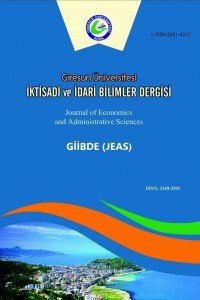POSTMODERN PAZARLAMA VE ZITLIKLARIN BİRLİKTELİĞİ
20 yüzyılın sonlarında hemen hemen her alanda etkisini göstermeye başlayan postmodern düşünce; felsefe, edebiyat, psikoloji, sosyoloji gibi birçok alanın yanında pazarlama alanında da etkisini göstermektedir. Hızlı gelişen teknoloji, modernizmden postmodernizme geçişi hızlandırmış ve kültürde yaygın bir değişime yol açmıştır. Pazarlama faaliyetlerinin kültüre bağımlı olarak hareket etmesi, bu kültürleri yansıtmak adına pazarlamada farklı gelişmelere yol açmaktadır. Birbiri ile ilişkisi olmayan sahneler ve kişiliklerin bir arada olması sonucu tüketiciler tüketim faaliyetlerini mevcut ortama göre şekillendirmişlerdir. Postmodern kültürün “zıtlıkların birlikteliği” koşulu “Her şey kabul edilir” söyleminin en önemli dayanağıdır
Anahtar Kelimeler:
Postmodernizm, Postmodern pazarlama, Zıtlıkların birlikteliği
Since the end of 20th century, postmodern thought which can be seen in almost every field has an impact on philosophy, literature, psychology, sociology as well as marketing. Rapidly developing technology has accelerated the transition from modernism to postmodernism and has led to widespread changes in culture. As a result of Marketing activities acting as culture dependent, different developments in marketing are used to reflect these cultures. Because of that scene and personalities which not related to each other coexist;consumers have shaped their consumption activities according to the current atmosphere. The element of postmodernism, “Juxtaposition of opposites”, is one of the main foundation of the saying “anything can be juxtaposed to anything else”
Keywords:
Postmodernism, Postmodern marketing, Juxtaposition of opposites,
___
- Addis, M. ve Podesta, S. (2005), “Long life to marketing research: a postmodern view”. European Journal of Marketing, 39 (3/4), 386-412.
- Brown S. (1993), “Postmodern Marketing?”, European Journal of Marketing, 27(4), 19-34.
- Berthon, P. ve Katsikeas C. (1998), “Essai: Weaving postmodernism”, Internet Research, 8(2), 149–155.
- Brown, S. (2006), “Recycling Postmodern Marketing”, The Marketing Review,6, 211-230.
- Christopher, M. (1989), “The existential consumer”, European Journal of Marketing, 23( 8), 80-84.
- Elliot, R. (1997), “Existential consumption and irrationnal desire”, European Journal of Marketing, 31(3/4), 285-296.
- Fırat A.F. (1991), “The Consumer in Postmodernity”, Advances in Consumer Research, 18, 70-76.
- Fırat A.F. (1992), “Postmodernism and the Marketing Organization”, Journal of Organizational Change Management, 5(1), 79-83.
- Firat, A.F. ve Venkatesh, A. (1993), “Postmodernity: the age of marketing”, International Journal of Research in Marketing, 10 (3), 227-49.
- Firat, F.A., Dholakia, N. ve Venkatesh, A.. (1995), “Marketing in a postmodern World”, European Journal of Marketing, 29(1), 40–56.
- Firat, A.F. ve Dholakia, N. (2006), “Theoretical and philosophical implications of postmodern debates: Some challenges to modern marketing”, Marketing Theory, 6(2), 123–162.
- Fırat A.F., ve Shultz C.J. (1997), “From Segmentation to Fragmentation: Markets and Marketing Strategy in the Postmodern Era”, Europesn Journal of Marketing, 31(3/4), 183-207.
- Gitlin, T. (1989), Postmodernism: roots and politics, in Angus, I. and Jhally, S. (Eds), Cultural Politics in Contemporary America, New York: Routledge
- Hamouda, M. (2012), “Postmodernism and Consumer Psychology: Transformation or Break?” International Journal of Academic Research in Business and Social Sciences, 2(1), 96-117.
- Jang, S., Liu, Y. ve Namkung, Y. (2011), “Effects of authentic atmospherics in ethnic restaurants: investigating Chinese restaurants”, International Journal of Contemporary Hospitality Management, 23(5), 662-680.
- Jorgensen, P.E. ve Yde, M. H. (2010), Branding in a Postmodern society- Green as a Differentiation Factor, Basılmamış Lisans tezi
- Malka, A.G., Grobler, A. ve Strasheim, A. (2013), “Suggesting new communication tactics using digital media to optimise postmodern traits in marketing”, South African Journal for Communication Theory and Research, 39(1), 122- 143.
- Nooteboom, B. (1992), “A postmodern philosophy of markets”, International Studies of Management and Organisation, 22(2), 53-76.
- Odabaşı, Y. (2012), Post Modern Pazarlama,İstanbul: MediaCat
- Procter, T. ve Kitchen, P. (2002), “Communication in postmodern integrated marketing” Corporate Communications: An International Journal, 7(3), 144–154.
- Sandikci, O. ve Omeraki, S. (2007), “Globalization and Rituals: Does Ramadan Turn into Christmas?”, Advances in Consumer Research?, 34, 610-615
- Yeygel, S. (2006), “Postmodern Toplumsal Yapının Pazarlamaya Getirdiği Yeni Boyut: Topluluk Pazarlaması (Tribal Marketing)”. Bilig, 38, 197-228
- ISSN: 2149-3391
- Yayın Aralığı: Yılda 2 Sayı
- Başlangıç: 2015
- Yayıncı: Giresun Üniversitesi
Sayıdaki Diğer Makaleler
AHISKA TÜRKLERİ İLE AHISKA YURDUNUN TÜRİYE İÇİN ÖNEMİ
“AHLÂKLI BİR SAVAŞ MÜMKÜN MÜ?” “HAKLI SAVAŞ HAKSIZ SAVAŞ”
POSTMODERN PAZARLAMA VE ZITLIKLARIN BİRLİKTELİĞİ
ABD’NİN KÜRESEL İMPARATORLUK TAHAYYÜLÜ ve BUNUN ARACI OLARAK “BÜYÜK ORTADOĞU” PROJESİ
OĞUZ ATAY’IN “TÜRKİYE’NİN RUHU” ÜZERİNE BİR DENEMESİ
MUHASEBE HATASI KAVRAMI, SORUMLULUĞU ve DÜZELTİLMESİ
TÜRKİYE-ERMENİSTAN İLİŞKİLERİNİN REALİST DIŞ POLİTİKA BAĞLAMINDA İNCELENMESİ
